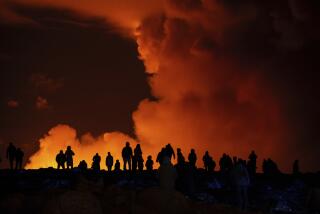Ash from Chile’s Puyehue volcano disrupts air travel
Peruvian President-elect Ollanta Humala, confronted Tuesday with canceled flights due to the ash cloud from Chile’s Puyehue volcano, resorted to traveling by boat instead of airplane to keep an appointment with Argentine PresidentCristina Fernandez de Kirchner.
A day earlier, United Nations Secretary-General Ban Ki-moon, also eager to meet with Fernandez, caught a bus for the 400-mile ride from Cordoba, Argentina, to Buenos Aires. His flight from Bogota, the Colombian capital, had been forced to land before reaching the Argentine capital because of Puyehue.
The officials, like thousands of other would-be air travelers, found themselves searching for alternative ways to reach their destination days after the volcano erupted June 4 in southern Chile. Humala, who is having a series of meetings with South American leaders, was traveling from Uruguay to Argentina.
The ash cloud over the Southern Hemisphere has spread as far as South Africa andAustralia.
The eruption has forced the evacuation of thousands of residents in Chile’s Ranco province but caused little disruption of Chilean flights. On most days, northeasterly winds have sent the ash plume into neighboring Argentina.
“It’s a release of the volcano’s internal pressure and of course it has brought grave consequences for air traffic and farming,” said Roberto Page, director of Argentina’s Institute of Geology and Mineral Resources. “It’s not possible to know with exactitude what will happen in the next few days, nor predict how long the phenomenon of the rain of ash will last.”
Buenos Aires’ international airport in Ezeiza has been closed for all or part of five days since the eruption. Several major airlines canceled flights Tuesday into and out of Argentina, Uruguay, Australia and Brazil. In a statement, Brazil-based Gol Airlines said it was taking measures out of concern for “the safety of our clients and employees.”
Even as the ash cloud continued to cause misery for air travelers, officials offered little hope for short-term improvement. One government geologist said Chilean officials have informed him that the volcano “continues in emission and could continue for the next two days.”
In addition to disrupting air travel, the volcanic ash is casting a cloud over Argentine agriculture, prompting authorities to declare a state of emergency for farmers. Tourism in Bariloche and Villa La Angostura, two popular winter sports destinations, has been thrown into disarray by the fall of up to 18 inches in ash.
Although Argentina’s aeronautical authorities on Tuesday gave airlines the green light to reschedule flights, Ezeiza airport remained closed through the early afternoon. The volcano is about 1,000 miles southwest of Argentina’s capital.
In Bariloche, the mountain resort city just 100 miles from the Chilean volcano, dense ash lying in thick layers made soggy by rain caused power and telephone outages and forced authorities to suspend classes. TV reports showed a city whose streets were deserted. The roofs of dozens of houses, mainly in low-income districts, collapsed under the weight of the ash.
Farm officials were concerned about the prolonged eruption’s continued effect on the 2 million head of sheep that graze in southern Argentina. Farmers in Chubut and Rio Negro areas said they have suffered five years of drought and the ash could destroy the little pastureland still serviceable. Rio Negro officials said 60,000 head of cattle also are “at risk.”
Haroldo Lebed, director of the national Agriculture Emergency and Disaster office, said he has declared a state of emergency for some Patagonian farm regions.
“This phenomenon on top of the years of drought the region has suffered is overwhelming in terms of the economic impact it is causing,” Lebed said. “It’s impossible to quantify the scale of the disaster.”
Special correspondents D’Alessandro reported from Buenos Aires and Kraul from Bogota.
More to Read
Start your day right
Sign up for Essential California for news, features and recommendations from the L.A. Times and beyond in your inbox six days a week.
You may occasionally receive promotional content from the Los Angeles Times.






